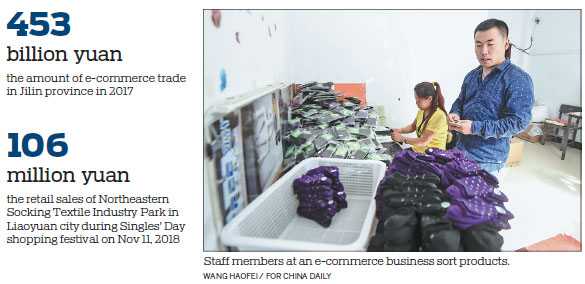Province harnessing the power of high-tech computing

Jilin province is stepping up its development of the digital economy in an effort to realize the national goal of revitalizing Northeast China.
Under the Digital Jilin plan, the province is promoting wider use of high-tech industries such as big data, cloud computing, internet of things and artificial intelligence.
It also promotes the deep integration of the digital economy with the primary, secondary and tertiary sectors of the economy, urban management and government services, to achieve major changes in the province's economic growth.
Jilin is a key growing area of commodity grain in China. Developing smart agriculture has become an important way to revitalize rural areas and modernize agriculture in the province. This is in line with the spirit of the 19th National Congress of the Communist Party of China.
Smart agriculture advocates precision agriculture. It is represented by soil testing for ideal fertilization and accurate irrigation to increase the level of information in the production processes.
This also boosts the integration of digital technological farming, fine and deep food processing, agricultural sightseeing and rural tourism.
Moreover, it has improved the traceability of agricultural products through the better sharing of information between upstream and downstream businesses.
In recent years, Jilin has seen immense growth in e-commerce. In 2017, trade in the sector climbed 37 percent year-on-year to 453 billion yuan ($67.72 billion).
The province was home to more than 8,000 e-commerce companies, including 108 provincial-level demonstration companies and 10 e-commerce demonstration parks.
Last year, Northeastern Socking Textile Industry Park, located in Liaoyuan city, sold 26.63 million pairs of socks online during the Singles' Day shopping festival on Nov 11. Retail sales reached 106 million yuan, more than five times the number in 2016.
In February, a provincial e-commerce portal went online, aiming to promote local commodities, encourage entrepreneurship and innovation, and alleviate poverty. In that month, it provided more than 2,000 kinds of commodities covering alcohol, tea, agricultural products, handicrafts and other local specialties.
As for people's livelihoods, Jilin will make continuous efforts to construct an intelligent city to enhance its public services and management capabilities. It will focus on digital technologies in sectors such as social aid, healthcare, tourism, traffic, education and community services. It plans to promote reconstruction and upgrade infrastructure such as water, gas and electric supply networks, street lighting, fire protection facilities and parking lots.
The province will also strengthen the maintenance and supervision of cyber and information security. It will seek breakthroughs in product and technological innovation in terms of safe production, major natural disaster prevention and public safety.
Cloud computing centers will be established in Changchun, Jilin, Liaoyuan and Baicheng cities. They will link up with government information systems of health, education, transport, social insurance and public affairs.
Digital technologies will be combined with cultural and ice-themed tourism to develop a batch of smart tourist zones and towns.
Jilin also encourages the development of Internet Plus financial institutes such as banks and insurance companies. It will also accelerate the building of cross-industry and transregional logistics information service platforms.

MOST POPULAR
- 1 China to give visa-free treatment to another 9 countries
- 2 China fully opens manufacturing sector to foreign investors in landmark opening up move
- 3 China's import expo attracts record-breaking participating countries, exhibitors
- 4 China's door opening even wider to foreign visitors, businesses
- 5 China revises rules to ease foreign strategic investment in listed firms
Editors' Picks
 Video:
Peru sees new port open
Video:
Peru sees new port open
 Infographic:
China's public holidays for 2025
Infographic:
China's public holidays for 2025
 Infographic:
Basic facts of APEC
Infographic:
Basic facts of APEC
 Infographic:
Wrapping up the 7th CIIE: Data recap
Infographic:
Wrapping up the 7th CIIE: Data recap



